|
|
|
Sort Order |
|
|
|
Items / Page
|
|
|
|
|
|
|
| Srl | Item |
| 1 |
ID:
085063
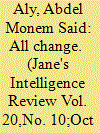

|
|
|
| 2 |
ID:
110089
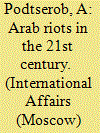

|
|
|
|
|
| Publication |
2011.
|
| Summary/Abstract |
THE WAVE OF POPULAR RIOTS which swept the Middle East and North Africa and which remains the key factor behind the regional developments engulfed not only the poor countries but also those which coped both socially and economically.
Between 2004 and 2009, for example, Tunisia increased per capita income from 3.5 thousand Tunisian dinars ($2.7 thousand) to 5 thousand TND ($3.9 thousand); its middle class (60% of population) accounted for 83% of total consumption; 80% were house owners; 21% had cars. In oil-rich Libya the year 2011 began very much as usual: foodstuffs and money were distributed among the poor; some families received free car coupons practically on the eve of the uprising.1
|
|
|
|
|
|
|
|
|
|
|
|
|
|
|
|
| 3 |
ID:
104640


|
|
|
| 4 |
ID:
106101
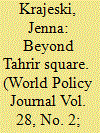

|
|
|
| 5 |
ID:
117823
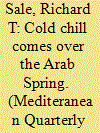

|
|
|
|
|
| Publication |
2012.
|
| Summary/Abstract |
Islam is on the march in the Middle East. For the past few years, in every Mideast election, the Islamic parties have won: in the Gaza Strip in 2006 and in Iraq and Tunisia in 2010. In 2011, they won again in Turkey and Morocco, and in Egypt the Islamist parties confirmed an overwhelming victory in the first parliamentary elections since the overthrow of Hosni Mubarak. The Muslim Brotherhood won the biggest share with the hard-line Salafist al Nour Party of Light. The youth groups that staged the demonstrations that toppled Mubarak took only seven seats. What are the implications for US policy and its ideals of self-determination and human rights? Will the liberals triumph, or will the Egyptian people face a hard-line Islamic future? This article attempts to answer these questions.
|
|
|
|
|
|
|
|
|
|
|
|
|
|
|
|
| 6 |
ID:
126410
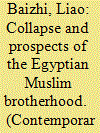

|
|
|
| 7 |
ID:
106388
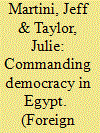

|
|
|
|
|
| Publication |
2011.
|
| Summary/Abstract |
Despite its vows to speed Egypt toward elections, the country's military leadership is actually ambivalent about democracy. Above all, Egypt's generals want to preserve stability and protect their privileges. But having unleashed democracy, the military may not be able to control it -- especially if Washington keeps up the pressure to move forward.
|
|
|
|
|
|
|
|
|
|
|
|
|
|
|
|
| 8 |
ID:
115058
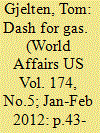

|
|
|
|
|
| Publication |
2012.
|
| Summary/Abstract |
For a fresh perspective on geopolitical trends, look at the world through the lens of the natural gas trade. One of the reasons for Israeli unease with the Arab Spring is that the democratic uprising that took down Hosni Mubarak also brought interruptions in Israel's supply of natural gas, much of which since 2008 has come from Egypt. Wondering about China's new interest in Australia and Qatar? It's about their abundant gas supplies and China's tremendous energy needs. Desperate for signs of cooperation from North Korea? Check out reports that Kim Jong-il may agree to the construction of a natural gas pipeline that would link Russia, Pyongyang, and Seoul. From Asia to the Middle East to North America, a boom in natural gas usage is rearranging international connections, with major repercussions for global politics.
|
|
|
|
|
|
|
|
|
|
|
|
|
|
|
|
| 9 |
ID:
109552
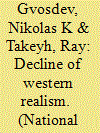

|
|
|
|
|
| Publication |
2012.
|
| Summary/Abstract |
WHEN OPERATION Odyssey Dawn commenced in the skies over Libya on March 19, 2011, it represented a major turnaround in U.S. policy. Only nine months earlier, U.S. ambassador Gene Cretz had characterized the regime as a "strategic ally" of the United States due to Libyan cooperation on counterterrorism and nonproliferation issues (and its halting, tentative steps toward greater openness). Now Libya found itself on the receiving end of conventional U.S. military power for repressing a civilian population agitating for governmental change.
|
|
|
|
|
|
|
|
|
|
|
|
|
|
|
|
| 10 |
ID:
126922


|
|
|
| 11 |
ID:
143181
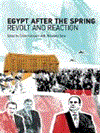

|
|
|
|
|
| Publication |
London, IISS, 2016.
|
| Description |
223p.pbk
|
| Series |
Adelphi Paper Series; 453-454
|
| Standard Number |
9781138653429
|
|
|
|
|
|
|
|
|
|
|
|
Copies: C:1/I:0,R:0,Q:0
Circulation
| Accession# | Call# | Current Location | Status | Policy | Location |
| 058454 | 962.056/HOK 058454 | Main | On Shelf | General | |
|
|
|
|
| 12 |
ID:
112488
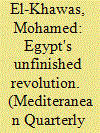

|
|
|
|
|
| Publication |
2012.
|
| Summary/Abstract |
Egypt's revolution has produced odd results. President Hosni Mubarak was replaced in 2011 by the military, which plans to stay in office until 2013. The interim government has been trying to reconcile the differing demands of young revolutionaries and emerging political parties. It has been struggling to deal with an ailing economy and deteriorating security. Although the goal is to transfer power to a democratically elected government, building an infrastructure for sustainable democratic institutions has been slow, messy, and difficult. Youth are disappointed in the outcome of their efforts to reform the country, fearing that the demands that triggered the revolution may not be met.
|
|
|
|
|
|
|
|
|
|
|
|
|
|
|
|
| 13 |
ID:
111109
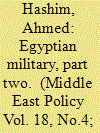

|
|
|
| 14 |
ID:
126924


|
|
|
| 15 |
ID:
103394
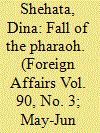

|
|
|
| 16 |
ID:
111717
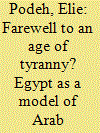

|
|
|
|
|
| Publication |
2012.
|
| Summary/Abstract |
When Hosni Mubarak, looking out of a palace window, saw the demonstrators down below on January 25, 2011, he turned to his advisor and exclaimed: "My God! It's a revolt!" "No, my President," was the answer, "that is a revolution." Well, alright, this legendary quote is usually attributed to French King Louis XVI, on July 14, 1789.1 Yet, judging by the mild response of the Egyptian police forces it is possible that, like his European predecessor, Mubarak did indeed underestimate the significance of the events unfolding before his eyes. The parable draws our attention to the important distinction between a revolt, a takeover and a coup on the one hand, and a revolution on the other.
|
|
|
|
|
|
|
|
|
|
|
|
|
|
|
|
| 17 |
ID:
111933
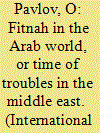

|
|
|
|
|
| Publication |
2012.
|
| Summary/Abstract |
NEARLY A YEAR HAS ELAPSED since the beginning of the Arab Spring; time has come to assess the preliminary results of the massive landslide started on a December day in 2010 by Mohamed Bouazizi, street vendor, who set himself on fire in a Tunis suburb to protest against police harassment and unemployment. This small stone set events in motion.
One after another the seemingly unshakable political regimes on the "Arab continent" were wiped out: two political doyens - Hosni Mubarak and Muammar Qaddafi - lost their "thrones"; President of Tunisia Zine El Abidine Ben Ali fled the country. Muammar Qaddafi lost even more than the throne - he lost nearly all his children and was shot through the head. Today when I am writing this article President of Yemen Ali Abdallah Saleh has come to the brink of resignation; King of Bahrain Khalifa still rules under pressure; the same can be said of President of Syria Bashar Assad. Reforms in Jordan are barely dragging on
|
|
|
|
|
|
|
|
|
|
|
|
|
|
|
|
| 18 |
ID:
115386


|
|
|
| 19 |
ID:
119421
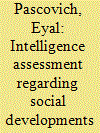

|
|
|
|
|
| Publication |
2013.
|
| Summary/Abstract |
The wave of protests that began in December 2010 and swept the Arab world ended dozens of years of regime stability in the Middle East. The spontaneous outpouring of the masses into the streets in protest of numerous years of dictatorship, tyranny, and corruption, for instance, in Egypt, took by surprise even those who allegedly understand the Egyptian street: journalists and academic experts active in this field; Western intelligence services, particularly in the United States and Israel, two countries that perceived Egyptian president Hosni Mubarak as an essential ally and an island of stability; and even among the Egyptian security and intelligence services, which, as in other dictatorial regimes, had invested considerable efforts into the regime's preservation.
|
|
|
|
|
|
|
|
|
|
|
|
|
|
|
|
| 20 |
ID:
111720


|
|
|
|
|
| Publication |
2012.
|
| Summary/Abstract |
In early August 2011, on the same day that Hosni Mubarak - once president of Egypt, now convicted for conspiring to kill protesters during the demonstrations that led to his ouster - was lying on a hospital bed in a Cairo court cage, Israeli Labor Member of Knesset Benjamin Ben-Eliezer revealed an amazing secret. He told the media that he and Prime Minister Binyamin Netanyahu had offered Mubarak political asylum. The offer came shortly after Feb. 10, 2011, the day when Mubarak transferred his authorities and left Cairo to go to his Sharm al-Sheikh palace. Sharm al-Sheikh is not far from Eilat, the city where Israel offered him asylum.i
Had Mubarak accepted this offer, Israel would clearly have put itself in the position of being the Arab people's enemy, perhaps not far behind Bashar al-Assad, the Syrian president, and Muammar Gaddafi of Libya. Mubarak's rejection rescued Israel from a very unpleasant situation, yet the proposal shows that Israel prefers the old order. Whereas many people around the world see mostly hope for this region, Israel sees risks. The Arab Spring is Israel's winter. No one has expressed this idea more eloquently than the skillful orator (in American English) Netanyahu.
|
|
|
|
|
|
|
|
|
|
|
|
|
|
|
|
|
|
|
|
|